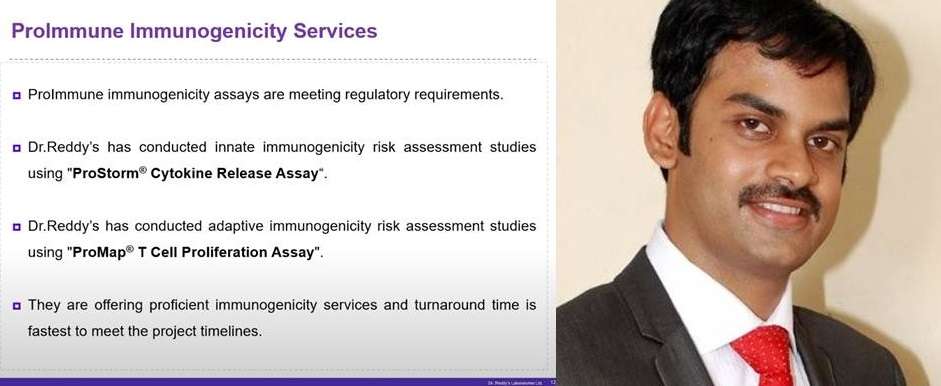Immunogenicity Risk of Complex Peptide Products
Evaluating Immunogenicity risk of Complex peptide products

Complex peptide drugs can be produced through recombinant or synthetic manufacturing processes. When developing either novel or generic peptides, the developer must demonstrate that any impurities present in the drug product (these can be host-cell derived, direct peptide-related impurities (i.e. truncated or inserted amino acids), or other non-peptide-related impurities) are not posing risks of immune activation that can lead to immunogenicity of the drug substance.
Where generic peptides are concerned (such as glucagon, liraglutide, teriparatide, teduglutide, nesiritide etc.), the responsibility is on the developer to demonstrate that:
1. for each peptide-related impurity found in both the Reference Listed Drug (RLD) and the generic peptide, the level of impurity in the synthetic peptide is not higher than in the RLD;
2. the generic peptide does not contain any new impurities more than 0.5% of drug substance;
3. for such impurities present, a justification can be provided as to why the that impurity would not be expected to affect the safety of the generic peptide compared to the RLD including with respect to immunogenicity.
This can be a daunting prospect for developers of such generic peptides as the technical capabilities required to provide this evidence are not typically available in-house. With the regulatory requirements constantly evolving as our knowledge deepens, you need to work with a trusted partner. ProImmune has more than 10 years of experience in this specific area and we will deliver high-quality reliable data for you in a rapid timeframe and in a format that is routinely reviewed by global regulatory authorities.
Learn how working with ProImmune will accelerate your regulatory approval for generic peptide products:
There are two key components: assessment of both Innate and Adaptive immunogenicity risk.
Assessment of Innate immunogenicity risk
The innate immune response is the body’s first-line, and usually rapid, defense against pathogens. In the context of peptide-related or process-related impurities, the risk is that these impurities can potentially trigger pattern recognition receptors (PRR) on antigen presenting cells that will activate the innate response pathway leading to cellular activation, production of cytokines and initiation of the adaptive immune response. This is a signature of product immunogenicity.
At ProImmune we deploy our ProStorm® Cytokine Release Assay to assess this risk. This is a fresh, whole blood assay where blood is drawn from a panel of healthy volunteers specifically for your study by a trained phlebotomist and then incubated with the test material within just 3 hours of blood draw. Following a 24-hour incubation period, a set of 7 cytokines associated with innate immune activation are quantified in the plasma. It is important to demonstrate appropriate sensitivity of the assay in the presence of your peptide drug. To this end, we spike in to a subset of the samples a range of Innate Immune Response Modulating Impurities (IIRMIs) at an array of concentrations. These IIRMIs are agonists of different PRRs typically including TLR2, TLR4, TLR5, TLR6, TLR7, TLR8, Dectin-1 and NOD2. It is also vital to confirm the viability of the diverse antigen-presenting cells (APCs) phenotypes (such as dendritic cells) that are responsible for responding to these impurities when drug products are tested at the maximal concentration.
Typically, a number of batches (minimum of 3) of both generic and RLD peptide are compared in this assay. It is also important to consider factors such as different API lots, batch expiry date as well as geographical lot release.
As experts in evaluating immunogenicity risks for complex generic peptides, ProImmune was honored to participate as subject matter experts in the recent workshop co-hosted by the US FDA and the Center for Research on Complex Generics (CRCG). Dr. Jeremy Fry, Director of Sales in ProImmune, outlined the comprehensive process followed at ProImmune to validate fresh whole blood assays. This includes establishing cytokine panels, generating standard curves, defining assay acceptance criteria (such as upper and lower limits of quantification), and confirming signal recovery and assay variability.
ProImmune’s ProStorm Cytokine Release Assay is on file with the FDA as a Drug Master File (DMF), simplifying the reference process for your Abbreviated New Drug Application (ANDA).
Assessment of Adaptive Immunogenicity Risk
Peptide-related impurities could consist of amino acid sequences that inadvertently have an increased affinity to MHC molecules (class I or class II). If a peptide impurity presented by the MHC is then recognised by a cognate T cell receptor in the context of appropriate co-stimulation, then the T cell adaptive immune response will have been activated. This then can lead to significant immunogenicity.
ProImmune has the capability of offering a range of orthogonal methods to assess these different elements of adaptive immunogenicity risk. The first is the functional ProMap® T cell Proliferation Assay which measures T cell proliferation using a flow cytometric readout over the course of 7 days in a panel of different healthy donor PBMCs labeled with CFSE following the addition of individual impurities and API tested at the maximal equimolar concentration that does not impact APC viability. ProImmune’s ProMap T cell Assay is on file with the FDA as a DMF, simplifying the reference process for your ANDA.
Another method is the ProImmune REVEAL® MHC-peptide Competition Binding Assay which can evaluate the binding affinity by determining the inhibitory concentration 50% (IC50) of individual impurities and API typically tested at a titration range of 12 concentrations against a panel of MHC class II alleles.
Further to the recent workshop co-hosted by the US FDA and the CRCG, Dr. Emilee Knowlton, Senior Immunology Sales Specialist in ProImmune, described about our ProPresent® Antigen Presentation MAPPS Assay to evaluate peptide presentation from API and impurities as well as detailing the experimental design considerations for the use of the MAPPS assay as an orthogonal approach for peptide immunogenicity assessment.
The full length presentation can be viewed here
If you would like copies of sample reports for any of the assays described or would like to discuss the technical details of your own project requirements in a confidential manner and receive a costed proposal, please don’t hesitate to contact our team of immunology specialists who will be delighted to assist you.
The full guidance for the FDA “ANDAs for Certain Highly Purified Synthetic Peptide Drug Products that refer to Listed Drugs of rDNA Origin” can be found here: https://www.fda.gov/media/107622/download

